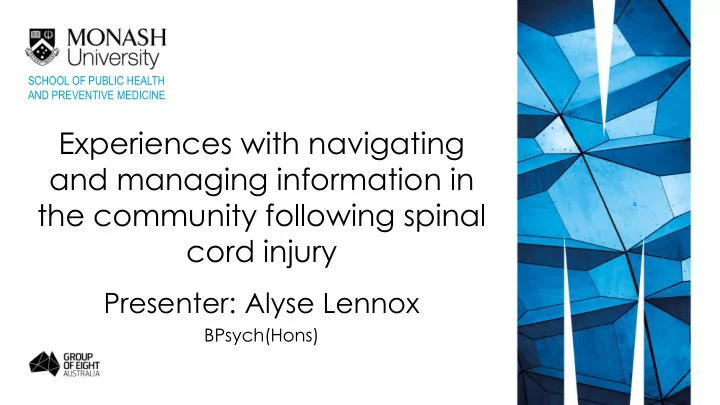

SCHOOL OF PUBLIC HEALTH AND PREVENTIVE MEDICINE Experiences with navigating and managing information in the community following spinal cord injury Presenter: Alyse Lennox BPsych(Hons)
BACKGROUND OSTEOPOROSIS 40% PRESSURE AREAS SPASTICITY $5.6M BOWEL COMPLICATIONS AUTONOMIC DYSREFLEXIA UTIs of Victorian patients readmitted to THERMOREGULATION CHRONIC PAIN hospital with a secondary condition within two years 2
AIM To describe, from the perspective of people living with SCI, their experiences with navigating and managing information in the community 3
METHODS 22 participants ▪ In-depth semi-structured interviews ▪ September-October 2015 ▪ Analysed using a qualitative thematic framework approach 4
DEMOGRAPHICS 50% had 68% lived in a 73% male 55% over 50 transport- metro location related injuries 5
RESULTS ▪ Sources of information ▪ Using SCI information ▪ Issues encountered 6
SOURCES OF INFORMATION Multiple sources of information • Desire to act as a source of information • and share knowledge
MULTIPLE SOURCES OF INFORMATION 8
MULTIPLE SOURCES OF INFORMATION 9
DESIRE TO ACT AS A SOURCE OF INFORMATION AND SHARE KNOWLEDGE 10
USING SCI INFORMATION Appraisal of SCI related information • • Learning to appraise information Delivery of information in a useful format • Information used as a springboard for • further searching
APPRAISAL OF SCI-RELATED INFORMATION 12
APPRAISAL OF SCI-RELATED INFORMATION 13
LEARNING TO APPRAISE INFORMATION 14
ISSUES ENCOUNTERED Feeling isolated • • Difficulties encountered with access to information through health professionals • Lack of information led to missed opportunities Frustration at the uncertainty surrounding SCI •
FEELING ISOLATED 16
DIFFICULTIES WITH ACCESS TO INFORMATION THROUGH HEALTH PROFESSIONALS 17
DIFFICULTIES WITH ACCESS TO INFORMATION THROUGH HEALTH PROFESSIONALS 18
FRUSTRATION AT THE UNCERTAINTY SURROUNDING SCI 19
CONCLUSION ▪ Provision of support to people with SCI early after injury to navigate and manage information ▪ Education to improve health literacy ▪ Greater linkage with GPs prior to rehabilitation discharge 20
ACKNOWLEDGEMENTS ▪ Sandra Braaf ▪ Belinda Gabbe ▪ Andrew Nunn ▪ Peter Trethewey ▪ Participants 21
THANK YOU Alyse.Lennox@monash.edu 22
Recommend
More recommend